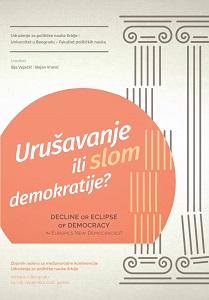Migracijska kriza u Europi i Hrvatskoj: politike integracije migranata
Migration Crisis in Europe and Croatia: Politics of Migrants Integration
Author(s): Siniša Tatalović, Ružica Jakešević
Subject(s): Migration Studies, Inter-Ethnic Relations, EU-Accession / EU-DEvelopment
Published by: Fakultet političkih nauka Univerziteta u Beogradu
Keywords: migration crisis; European union; Croatia; migrant integration policies; national minorities
Summary/Abstract: Recent discussions on diversity management in the European context have been more and more directed towards the integration of migrants, or so called new minorities. While some European countries, such as Germany, France, United Kingdom and the Netherlands have a very rich experience as migrant receiving countries, countries like Croatia, which are new EU members do not have such experience or have very limited one. Issues of asylum and migration are discussed and agreed on at the EU level in order to create common policies, while the models of integration are within the competences of member states. This is also evident in the past and current policies and practices of the EU member states, which put different emphasis on the political, socio-economic and cultural dimension of integration in their integration policies. Croatian position is specific in this regard – it is a new member of the European Union; it is not a member of the Schengen system; traditionally it hasn’t been a destination but a transit country for migrants; and it has a very developed system and rich experience in the integration of traditional national minorities. Due to contemporary migration flows and the experiences of some Eastern and Central European countries that have become EU members before the Croatian, it is certain that in the coming period Croatia will be faced with the higher rate of immigration. In addition, according to the quota system of the EU, Croatia has committed itself to receive and provide for 1,600 people in the period between 2016 and 2018. As part of a (future) migration policy, it is necessary to define and create sustainable migrant integration policy. Hence, the question is whether the experience in the integration of national minorities into Croatian society in whole or in part can be applied the new communities that will be shaped by migrants permanently residing in Croatia.
Book: Urušavanje ili slom demokratije
- Page Range: 183-200
- Page Count: 18
- Publication Year: 2016
- Language: Croatian
- Content File-PDF

